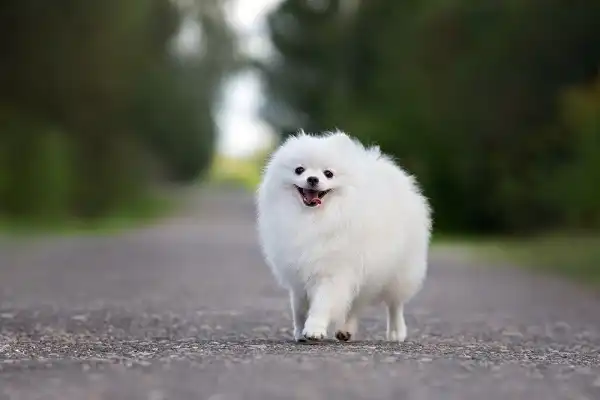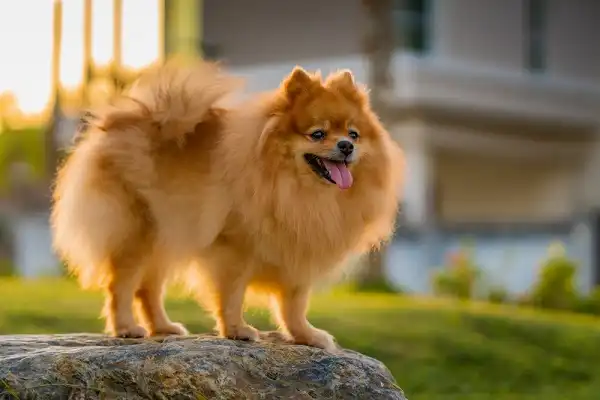For centuries, the Pomeranian has been a beloved companion of royals and admired by people all around the world. With their charmingly mischievous personalities, royal heritage, and unrivaled cuteness, it’s no wonder that this little pup is one of today’s most popular dog breeds. If you have been considering adding a bundle of fur to your life or if you’re simply curious about these captivating pooches – then keep reading! This will be your complete guide to everything Pomeranian related: from breed origins to temperament traits and care needs — we’ve got it all covered here.

Pomeranian Description
The Pomeranian is a small, compact dog breed that is known for its long, fluffy coat and lively personality. They are part of the toy dog group and can range in weight from three to seven pounds. Their origins can be traced back to the region of Pomerania, which was once a part of Germany and Poland. It wasn’t until the 19th century when Queen Victoria of England fell in love with the breed that they really became popularized. One of the most distinctive features of the Pomeranian is their double coat, which is composed of a soft, fluffy undercoat and a longer, coarser topcoat. They come in a wide variety of colors and patterns, including black, white, orange, cream, sable, and brindle. Despite their somewhat high maintenance coat, they do not shed excessively and can be a good choice for people with allergies.
Pomeranian Habitat
Pomeranians are adaptable little dogs that can thrive in a variety of living situations, making them ideal for apartment life and city living. However, they do have a high energy level and need plenty of exercise and opportunities to explore their environment. A daily walk or playtime in a secure yard or park is essential to keep them happy and healthy. While they can adjust to living in smaller spaces, they still require mental stimulation to prevent boredom and destructive behavior. Providing toys, puzzles, and interactive games can help keep their minds engaged and prevent them from becoming anxious or restless. When it comes to climate, Pomeranians are fairly adaptable, but they do have a thick coat that can make them more comfortable in cooler temperatures. However, they can overheat easily in hot and humid environments, so it’s important to provide them with plenty of water, shade, and air conditioning during the summer months. No matter where they live, Pomeranians thrive on human companionship and attention. They are social dogs that love to be around their family and may become anxious or destructive if left alone for long periods of time. For this reason, they are best suited for homes where someone is around during the day to keep them company or for families that can provide them with plenty of love and attention when they are home.
Pomeranian Diet
Proper nutrition is vital for the health and well-being of Pomeranians. As with all dogs, the Pomeranian’s diet should consist of a balance of proteins, fats, and carbohydrates. However, due to their small size, they have unique dietary requirements that should be taken into consideration. A high-quality, commercial dog food that is specifically formulated for small breeds is a good starting point for a Pomeranian’s diet. Look for a food that lists a protein source, such as chicken or lamb, as the first ingredient. Avoid foods that contain filler ingredients, such as corn or wheat, which can be difficult for Pomeranians to digest. In addition to commercial dog food, Pomeranians can also benefit from the addition of fresh fruits and vegetables to their diet. These can provide additional vitamins, minerals, and fiber that may be lacking in their regular diet. Good options include carrots, green beans, apples, and blueberries. It’s important to note that Pomeranians have small stomachs, which means that they can only eat small amounts of food at a time. Feeding them several small meals throughout the day, rather than one or two larger meals, can help prevent digestive issues and ensure that they receive adequate nutrition.

Pomeranian Size
Pomeranians are small, toy-breed dogs that typically weigh between 3 and 7 pounds and stand between 6 and 7 inches tall at the shoulder. Despite their small size, they are known for their big personalities and feisty energy. Their size makes them well-suited for apartment living, but they do require regular exercise and playtime to keep them healthy and happy. A daily walk or play session in the yard can help keep them physically and mentally stimulated. Pomeranians may be small in size, but they are big in personality and love.
Pomeranian Lifespan
Pomeranians have an average lifespan of 12-16 years, although some may live even longer with proper care and attention. Like all living beings, their lifespan can be influenced by a variety of factors, such as genetics, diet, exercise, and medical care. One of the key factors that can impact the lifespan of a Pomeranian is its diet. Feeding them a balanced and nutritious diet that meets their unique dietary needs can help support their overall health and well-being, which in turn can contribute to a longer lifespan. It’s important to choose a high-quality commercial dog food that is specifically formulated for small breed dogs, as well as incorporating fresh fruits and vegetables into their meals. This can help provide them with the necessary vitamins, minerals, and nutrients that they need to thrive. In addition to diet, regular exercise is also important for extending the lifespan of a Pomeranian.
While they may be small in size, they are still energetic and playful dogs that require daily exercise to keep them physically and mentally stimulated. A daily walk or play session in the yard can help keep them healthy and happy, and can also help reduce their risk of obesity, which can negatively impact their lifespan. Regular medical care is another important factor in promoting the lifespan of a Pomeranian. Routine check-ups with a veterinarian can help detect and treat any health issues early on before they become more serious. This can include regular dental check-ups to prevent tooth decay and gum disease, as well as monitoring for genetic conditions that Pomeranians may be predisposed to, such as luxating patellas and hypoglycemia.
Pomeranian Behavior
Pomeranians are known for their larger-than-life personalities that make them stand out from other dog breeds. Despite their tiny size, these dogs have a lot of spunk and energy, which can make them a challenge to handle for inexperienced pet owners. One of the most distinctive traits of Pomeranians is their insatiable curiosity. They are always exploring their surroundings and investigating every nook and cranny they can find. This natural curiosity can sometimes get them into trouble, especially if they manage to escape from their home or yard. In addition to being curious, Pomeranians are also incredibly intelligent. This can make them difficult to train at times, as they have a tendency to try and do things their own way. Positive reinforcement training methods are essential when it comes to training these dogs, as they respond well to praise and rewards.
Another common behavior trait in Pomeranians is their attachment to their owners. These dogs are very loyal and affectionate, and they thrive on human interaction. They are happiest when they are with their owners, and they can become quite anxious and upset when left alone for long periods. Despite their affectionate nature, Pomeranians can be quite vocal at times. They have a tendency to bark excessively, which can be a nuisance to neighbors and visitors. This behavior can be controlled through proper training, but it requires time and consistency to achieve lasting results. Finally, it’s worth noting that Pomeranians can be quite territorial. They are fiercely protective of their families and homes, and they may become aggressive toward strangers or other dogs. Socialization is important for all dogs, but it is particularly crucial for Pomeranians to help them learn appropriate behavior around other animals and people.

Pomeranian Speed
Pomeranians may be small in size, but they have a surprising amount of energy and can be incredibly fast. In fact, they have been known to reach speeds of up to 20 miles per hour! This impressive speed is due in part to their muscular legs and lean, agile bodies. Pomeranians are also quick and nimble, with the ability to quickly change direction and make sudden stops. This agility makes them well-suited for activities like agility training and obedience competitions. In addition to their physical speed and agility, Pomeranians are also quick thinkers. They are known for their intelligence and problem-solving abilities, which allow them to quickly assess a situation and react accordingly.
Pomeranian Hunting
While Pomeranians are mostly known for their affection and lively temperament, they also have a strong hunting instinct that can be traced back to their ancestors. Originally bred in Germany as large sled dogs, Pomeranians were later downsized to become lapdogs, but their hunting instincts still remain. Pomeranians have a keen sense of smell and are known for their ability to track and hunt small prey such as rodents and birds. Their sharp ears also help them detect movements and sounds, which makes them excellent watchdogs. Despite their small size, Pomeranians are surprisingly brave and tenacious hunters. They are not afraid to take on animals that are larger than them, and their hunting style is characterized by their quick movements and sharp reflexes. In addition to their natural hunting abilities, Pomeranians can be trained for hunting activities such as retrieving, tracking, and agility. These dogs are quick learners and respond well to positive reinforcement, so training them for hunting can be both fun and rewarding for both the dog and the owner.
Pomeranian Grooming
Pomeranians require regular grooming and care to keep them looking their best. Their long, double-coat of fur usually requires daily brushing to prevent matting and tangling, as well as occasional baths or trims. In addition, their nails should be clipped regularly in order to prevent cracking and splitting. In terms of health care, Pomeranians are generally healthy dogs but they may be prone to certain conditions such as luxating patellas, allergies, eye problems, heart murmurs, and colds. Therefore, it is important to provide your pet with regular veterinary checkups and screenings in order to catch any issues that may arise. Additionally, it is also important to ensure that your dog gets regular exercise to help maintain their physical and mental well-being.

Conclusion
Pomeranians are known for their intelligence and affectionate nature, but they also have a hidden side to them – their hunting instinct. These dogs have a natural ability to track and hunt small animals such as rodents and birds, and with proper training, they can be great hunters. Additionally, Pomeranians have a strong build that allows them to move quickly and confidently, making them perfect companions for active individuals and families. So if you’re looking for an intelligent and energetic breed of dog, then the Pomeranian might just be the perfect pet for you.
Frequently Asked Question


